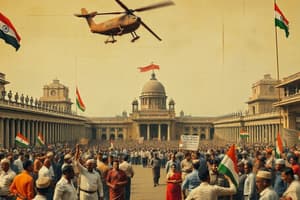Podcast
Questions and Answers
Who was a pioneer in Satyagraha and a staunch advocate for Indian independence?
Who was a pioneer in Satyagraha and a staunch advocate for Indian independence?
- Jawaharlal Nehru
- Mahatma Gandhi (correct)
- Sardar Vallabhbhai Patel
- Subhas Chandra Bose
In what year was the Indian National Congress (INC) established?
In what year was the Indian National Congress (INC) established?
- 1905
- 1885 (correct)
- 1825
- 1947
Which leader within the INC was known for his socialist ideals and secular principles?
Which leader within the INC was known for his socialist ideals and secular principles?
- Bal Gangadhar Tilak
- Subhas Chandra Bose
- Lala Lajpat Rai
- Jawaharlal Nehru (correct)
What was the primary role of the INC when originally established in 1885?
What was the primary role of the INC when originally established in 1885?
Which leader advocated for non-violent resistance and self-reliance, leaving a profound impact on the INC?
Which leader advocated for non-violent resistance and self-reliance, leaving a profound impact on the INC?
What ideology helped shape India's post-independence policies, including its approach to nationalism, as influenced by a key figure in the INC?
What ideology helped shape India's post-independence policies, including its approach to nationalism, as influenced by a key figure in the INC?
Which movement was characterized by non-violent protests against British rule in India?
Which movement was characterized by non-violent protests against British rule in India?
What significant role did the Indian National Congress play post-independence?
What significant role did the Indian National Congress play post-independence?
Which document was drafted by the Indian National Congress post-independence?
Which document was drafted by the Indian National Congress post-independence?
What is a core principle of the INC's political platform?
What is a core principle of the INC's political platform?
Which political party is currently the largest in India?
Which political party is currently the largest in India?
What has been the INC's role in shaping India's nationalistic identity?
What has been the INC's role in shaping India's nationalistic identity?
Study Notes
Indian National Congress and Nationalism in India
The Indian National Congress (INC) has played a pivotal role in shaping India's nationalistic identity, having been at the forefront of the country's freedom struggle against British rule. Born out of a desire for self-governance and the protection of indigenous rights, the INC has continuously evolved alongside India's nationalistic sentiments, reflecting the country's complex and diverse history.
Origins of the Indian National Congress
Established in 1885, the INC was originally a platform for British-educated Indians to discuss local issues and share concerns with British administrators. However, as the colonial government's policies and actions became more repressive, the INC transformed into a powerful political force, driven by growing nationalism.
Key Figures in the INC's Nationalistic Identity
Several prominent leaders within the INC contributed to the development of Indian nationalism. Among these are:
- Mahatma Gandhi: A pioneer in Satyagraha (non-violent resistance) and a staunch advocate for Indian independence, Gandhi's influence on the INC was profound. His principles of non-violence and self-reliance continue to be crucial tenets of Indian nationalism.
- Jawaharlal Nehru: A key figure in the nationalist movement, Nehru's socialist ideals and secular principles helped to shape India's post-independence policies, including its approach to nationalism.
- Bhagat Singh: A revolutionary socialist and a young leader of the INC who, alongside his comrades, gave his life to the cause of Indian independence through his actions in the Lahore Conspiracy Case.
The INC and the Freedom Struggle
The INC led a series of non-violent and violent campaigns, including the Non-Cooperation Movement (1920-22), the Civil Disobedience Movement (1930-34), and the Quit India Movement (1942) as the struggle for independence intensified.
The INC and Post-Independence India
Following India's independence in 1947, the INC ruled as the dominant political party, contributing significantly to the country's political and economic development. Notable achievements during this period include the drafting of the Indian Constitution, the launch of several nationwide development programs, and the consolidation of India's secular identity.
The INC and Contemporary Indian Nationalism
The INC is currently the largest political party in India, continuing to play a central role in shaping the country's nationalistic identity. The party's political platform is rooted in India's rich cultural heritage, secular principles, and commitment to democracy and social justice.
Conclusion
From its inception, the Indian National Congress has been a driving force behind India's nationalistic aspirations. Through the efforts of its key figures and the pursuit of its ideals, the INC has played an indispensable role in India's journey towards independence, self-determination, and unity. As the country continues to evolve, the INC remains committed to fostering a strong national identity that is inclusive and respectful of the diverse cultural backgrounds that comprise the Indian nation.
Studying That Suits You
Use AI to generate personalized quizzes and flashcards to suit your learning preferences.
Description
Test your knowledge about the Indian National Congress (INC) and its pivotal role in shaping India's nationalistic identity throughout history, from its origins to contemporary politics. Explore key figures, freedom struggle movements, post-independence contributions, and the INC's impact on India's nationalistic identity.



